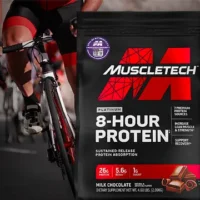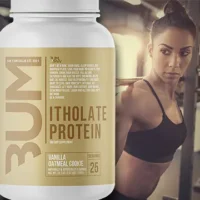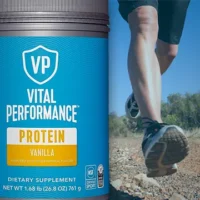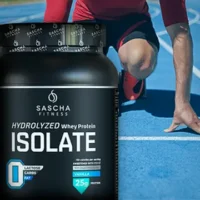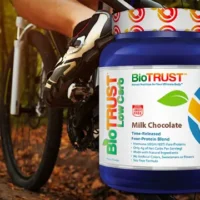Ingredientsprotein ingredient glossary
Quillaja extractSoapbark extract
Quillaja extract, derived from the Chilean soapbark tree, is a natural substance used in protein powders as an emulsifier and foaming agent. It helps to create a smooth texture and creamy protein shakes that are easier to consume.
Resveratrol
Resveratrol, a natural compound found in plants, is added to protein powders due to its potential health benefits, including improving heart health and reducing inflammation. It may also improve exercise performance and reduce muscle damage.
RetinolVitamin A
Retinol, a form of vitamin A found in animal-derived foods, is also available in synthetic form as a dietary supplement and is sometimes added to protein powders.
RiboflavinVitamin B2, Lactoflavin
Riboflavin, also known as Vitamin B2, is a water-soluble vitamin used in protein powders due to its ability to support energy metabolism and protect against oxidative stress.
RibonucleaseRNase
Ribonuclease is an enzyme that is sometimes added to protein powders to aid in the digestion and absorption of protein, potentially increasing the bioavailability of dietary protein and improving protein synthesis.
Ribose
Ribose is a naturally occurring sugar in the body that plays a role in energy metabolism. It is sometimes added to protein powders to help improve athletic performance and reduce muscle fatigue by increasing ATP production in the body.
Saccharin
Saccharin is a non-nutritive artificial sweetener used in some protein powders. It is much sweeter than sugar and helps reduce calorie and sugar intake.
Silicon dioxideSilica
Silicon dioxide is a natural compound found in quartz, sand, rocks, and soil. It is used as an anti-caking agent in protein powders to prevent clumping, and as a stabilizer and thickener in food products.
Sodium ascorbateVitamin C
Sodium ascorbate is a form of vitamin C that is added to protein powders to boost their nutritional value. It helps maintain a healthy immune system, supports collagen production, and acts as an antioxidant.
Sodium benzoate
Sodium benzoate is a common food preservative used in protein powders to extend shelf life by inhibiting bacterial and fungal growth.
Sodium carboxymethylcellulose
Sodium carboxymethylcellulose (CMC) is a food additive derived from cellulose that is added to protein powders as a thickener, stabilizer, and emulsifier. It improves texture, prevents clumping, and enhances stability.
Sodium caseinate
Sodium caseinate (otherwise known as casein) is a milk-derived protein that is often used in protein powders due to its high protein content. It is a slow-digesting protein that provides a sustained release of amino acids into the bloodstream.
Sodium chlorideSalt, Table Salt
Sodium chloride, or salt, is used in protein powders as a flavor enhancer and to maintain proper fluid balance and blood pressure.
Sodium citrate
Sodium citrate, a salt of citric acid, is used in protein powders to regulate pH, improve texture, and prevent spoilage.
Sodium metabisulfite
Sodium metabisulfite is a food preservative used in protein powders to prevent oxidation and extend shelf life.
Sodium phosphateMonosodium phosphate, Disodium phosphate, Trisodium phosphate
Sodium phosphate is a salt commonly used as a pH stabilizer and buffering agent in protein powders. It may also serve as a source of dietary phosphorus.
Sodium stearyl fumarate
Sodium stearyl fumarate is a food additive used in protein powders as a flow agent to prevent clumping and improve flow.
Sorbitan monostearate
Sorbitan monostearate is an emulsifier used in protein powders to stabilize the mixture and prevent separation. It also improves texture, giving a more creamy mouthfeel.
Spirulina
Spirulina is a blue-green algae used in protein powders for its high protein content and nutrient density, particularly for vegans and vegetarians. Potential benefits include improved immune function and reduced inflammation.
Steviol glycosideStevia
Steviol glycosides are a low-calorie sweetener extracted from Stevia rebaudiana plant leaves, commonly used in food and beverage products as an alternative to sugar for people with diabetes or watching their weight.
The content on this site has not been written, reviewed or endorsed by a medical professional. We assume no liability for the misuse of supplements and recommend you review the label of any product, as well as consulting with your health care professional.
We are a participant in the Amazon Services LLC Associates Program, an affiliate advertising program designed to provide a means for us to earn fees by linking to Amazon.com and affiliated sites.
We are a participant in the Amazon Services LLC Associates Program, an affiliate advertising program designed to provide a means for us to earn fees by linking to Amazon.com and affiliated sites.
© 2025 ProteinPowder.com
